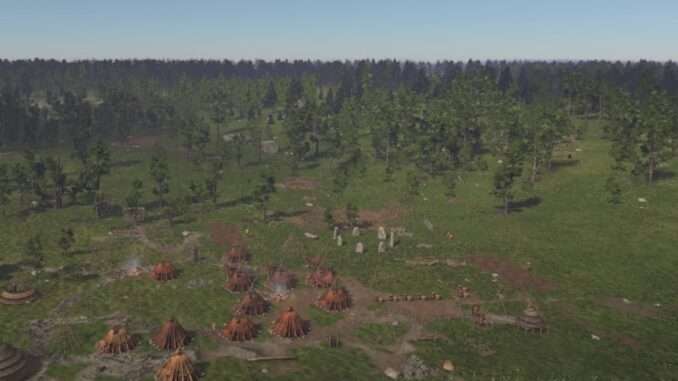
After reading and answering your questions about the official version of the game, we have decided to write this guide where we will explain those things that make this game different or that simply need to be explained in detail.
Game Mechanics & Concepts Explanatory Guide
Nomadism and sendentarism in the game
The first original thing when you play this city builder is that you sometimes need to migrate to other place.
There are some reasons why it may be interesting or necessary to migrate in the game:
The game allows you to play in very different areas of Atlantic Europe and also during a wide historical period with big climatic changes.
The climate definitely influences the flora and fauna of each place, not only in the types of species but also in their growth and reproduction.
Thus, some natural resources may become scarce and you will have to move to a new location to get enough for your growing tribe.
It may also be interesting to migrate close to other tribes to facilitate trade or looting…
All this until the arrival of agriculture and livestock farming, which will give you the ability to settle down definitively.
Tip: If you dont like the migration mechanic, just go Neolithic!
Communal tasks, work groups and priorities
This game includes the separation of communal work and specialized work into work groups.
This is the reason why the tribe panels are separated from the rest of the groups and you have to make that “extra” click to open the tribe panel.
It is also the reason why there is a tool to assign buildings and animals to groups, as the tasks related to them will only be performed by the members of that group. Note that if you assign them to the tribe their tasks will be communal to the tribe.
In this way your tribe members will work during the central part of the day on their specialized work and the rest of the day doing communal work.
Everyone will choose the tasks based on their skills and knowledge but also based on the priority you have set, distance to the tasks, current task and many other parameters.
Which tasks are done first is controlled by the priorities of each workgroup or if you want to be more specific by the priority of each building.
Tip: Use the communal policy slider to prioritize communal tribe tasks or those of specialized groups.
Culture, knowledge and requirements
Your tribe is made up of individuals who may belong to different cultures which results in your tribe having a main culture and other secondary cultures each with a percentage in the mix.
On the other hand each individual has a certain level of knowledge. The maximum individual levels in the tribe make up the knowledge levels of the tribe.
The cultural mix and the knowledge levels of the tribe have to fullfile the requirements of the constructions, manufactures and working groups etc. so that they are available to the tribe.
If the person with the highest level of a knowledge dies or leaves, you may lose the ability to create some buildings, tools or groups for a while.
The new skills will come with the migrants and you will have the mission to spread them among the members of your tribe so that they are not lost by putting enough people to work on the same tasks so that not only the experts practice them.
Your wisest and smartest citizens will eventually improve the knowledge level of the tribe while doing knowledge related tasks or when reflecting during their free time.
Food and starvation
You must supply food to your tribe members and livestock, store it properly for the seasons when you cannot get it and protect it from wild animals.
For feeding your tribe you create gathering, hunting and fishing groups and when you have the necessary knowledge or cultural mix farming and herding groups.
When some of your tribe members have not eaten for a while they will develop the starvation disease which can lead to death and from which they can slowly recover after several days of eating properly.
An individual with starvation will work less, complain a lot and may even leave the tribe if his unrest level rises high enough.
Housing
Building adequate housing to meet the growing demands of your citizens is another of your main tasks.
When your citizens learn of the existence of better housing they will start to want it and if you ignore their requests for a long time they will start to get angry. They will get angry sooner or later also based on the difficulty you have set up the game.
If only a few of your houses meet the requests of your citizens they will take turns using them and this will lessen their complaint. It is always better to have some adequate housing than none at all.
Tip: Create some fireplaces for the homeless to avoid maximum unrest.
Overwork
Through labor policies you can temporarily increase the work force or the work schedule. If you keep the pressure on too long people will start to complain, which will add to the other sources of unrest and may lead some tribe members to leave the tribe.
Tip: Keep the tribe panel open to check if something is going wrong.
Unrest & Religion
Unrest is the reason why tribe members will want to leave the tribe. The level of unrest they endure until they leave depends on individual will attribute but also on the difficulty level you have set for the game.
To avoid unrest you have to provide what your citizens ask for but if this is not possible temporarily you can create temples as a way to sublimate the unrest of the tribesmen with the connection to the ancestors and the forces of nature.
Prayers will consume a lot of your tribe members’ time during which they will not work.
You can enhance the effect of your temples by building religious structures around them so that the appeasement they produce is faster. The more and more overwhelming these structures are the better!


Be the first to comment